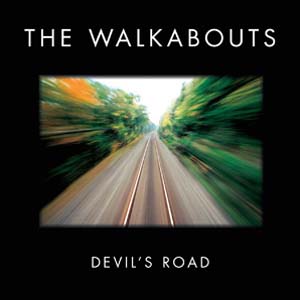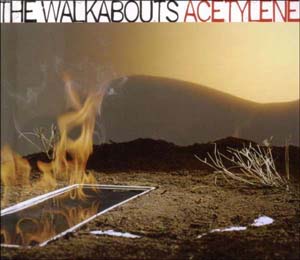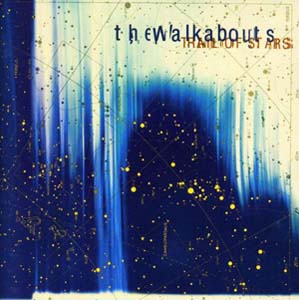|
Warenkorb / Shopping Cart:
Artikel 0,00 €      |

|
|
Suche / Search
|
|
STOPPOK |
|
VORVERKAUF |
|
# |
|
# |
|
|
|
Keep an eye on...
DAMAGED GOODS |
|
ON THE DEcKS |
|
ON THE DECKS |
|
OBS 28 |
|
WIEDER DA! |
|
|
|
----- |
|
SUPER SAMPLER |
|
50s/60s R'n'B |
|
|
|
|
|
GESCHENK |
|
|
|
|
|
|
|
|
|
|

|
|
||||||||||||||||
Deluxe Reissue des lang vergriffenen 1997er Klassikers inkl. Bonus CD mit fünf unveröffentlichten Tracks. Kommt im Multi-fold Digipak mit erweitertem Artwork und 16-seitigem Booklet. Die Doppel-LP kommt in audiophilem 180 Gramm Vinyl im Gatefold-Cover plus beiden CDs!
Seit 30 Jahren arbeiten sich The Walkabouts an einem Thema ab, das gleichermaßen Geburtsstätte wie übergeordneter Gegenstand des Rock’n’Roll ist und zu dessen Legendenbildung sie in derselben Weise beitragen wie sie sie hinterfragen: Amerika, als mythischer Ort mit all den Sehnsüchten, die auf ihn projiziert und all den Hoffnungen, die an ihn geknüpft werden, aber auch mit seinen Widersprüchen und Ungereimtheiten.
The Walkabouts wurden 1984 von Sänger und Songwriter Chris Eckman und der Sängerin Carla Torgerson in Seattle gegründet. Als einzige Genre-fremde Band veröffentlichten sie ab 1989 ihre Alben auf dem SubPop-Label, das damals mit Nirvana, Soundgarden und Mudhoney im Zentrum der Grunge-Euphorie stand. Ironie der Musikgeschichte: Während der Grunge lediglich ein musikalisches Strohfeuer gewesen ist, wurde die Musik der Walkabouts – Folk, Americana und Country, unter Kenntnis von Punk und seiner Folgen gespielt – zu einer der maßgeblichen und beständigen Musikrichtungen in den folgenden Jahrzehnten. 1992 trennten sich The Walkabouts von SubPop und wurden von SubPop Europe unter Vertrag genommen, das damals von Glitterhouse Records in Beverungen repräsentiert wurde. Nach einem Intermezzo beim Major-Label Virgin Records mit den Alben „Devil’s Road“ (1996) und „Nighttown“ (1997) kehrten The Walkabouts 1999 zu Glitterhouse zurück, wo sie seither die Mehrzahl ihrer Alben und die ihrer zahlreichen Neben- und Seitenprojekte veröffentlichen. Es war eine Art Konzeptalbum über die Stadt bei Nacht: „Nighttown“. Die nächtliche Stadt dient hier, ähnlich wie das übergeordnete Walkabouts-Thema „Amerika“, als Metapher, als ein surrealer Sehnsuchtsort voller Möglichkeiten und Erwartungen. Gesteigerte Erwartungen hatte auch das Label an dieses Album, das zweite und letzte, das The Walkabouts für Virgin eingespielt haben. Seine Entstehungsgeschichte nährt das Vorurteil vom Major-Label als – nennen wir es – ungünstiger Einflussnehmer auf künstlerische Entscheidungen. „Devil’s Road“, ein Jahr zuvor veröffentlicht, war nach Major-Maßstäben kein Hit. Es erfüllte aber die Erwartungen des Labels an eine kleine Band wie The Walkabouts. „Wir bekamen großen Druck von Virgin“, erinnert sich Chris Eckman. „Sie meinten: Wir haben die Chance euch voranzubringen, lass es uns schnell tun. Es war Sommer 1996, ich hatte keinen einzigen Song geschrieben. Und Virgin wollte, dass wir im Januar ins Studio gehen. Das war verrückt. Ich war zu dieser Zeit ziemlich gestresst. Ich nahm einen Monat eine Auszeit, wofür wir extra Tourtermine gecancelt haben. Und dann schrieb ich innerhalb eines Monats die Songs. Wir probten jeden Tag, fünf Tage die Woche, drei Monate lang. Es war ein sehr intensives Projekt.“ Wieder ist das Warschauer Philharmonieorchester dabei, wieder Arrangeur Mark Nichols. Angestachelt durch die Erfahrungen mit „Devil’s Road“ trauen sich The Walkabouts jetzt Dinge, die sie vorher für übertrieben hielten. Streicherarrangements werden üblicherweise in der Popmusik zur Verkitschung eingesetzt, bei „Nighttown“ tragen sie zur kunstvollen Verdüsterung der ohnehin nocturnen Atmosphäre bei. Chris Eckman: „Wir wollten die Streicher nicht, um unsere Musik poppiger zu machen. Meine Referenzpunkte waren eher die frühen Soloalben von Scott Walker und Songs wie ,Kathleen’ von Townes Van Zandt und die auf John Cale‘s Album ,Paris 1919’. Ich wollte keine schlechten Middle-Of-The-Road-Songwriter-Streicher haben“.
Ironischerweise ist die „seltsame Platte“ (Eckman über „Nighttown“), trotz der eher ungünstigen Rahmenbedingungen für die Band stringenter und kunstvoller ausgefallen als der Vorgänger. Die Streicher und die filigranen Arrangements verschmelzen mit den Songs zu kompakten Klanggebilden. „Die Walkabouts sind unpeinliche Romantiker, selbstbewusste Außenseiter, melancholische Lebenskünstler, die wissen: Das Dasein ist ein langer, ruhiger Fluss, der mitten hineinführt ins Herz der Finsternis“ – mit diesen Worten schloss Peter Felkel damals seine Kritik von „Nighttown“ für den „Musikexpress“. Ein Satz der immer noch Gültigkeit besitzt. - Albert Koch
Herstellerinformationen
Glitterhouse Records GmbH
Schlachthofstr. 36a
21079 Hamburg
Deutschland
www.glitterhouse.com
Deluxe Reissue of their 1997 classic with re-worked and extended artwork plus a bonus CD containing five unreleased tracks of that period. Comes in a multifold digipak with 16 page booklet and as a two-LP set (180 gram heavyweight vinyl, gatefold sleeve) plus two CDs!
For 30 years The Walkabouts have written and sung about one of their main topics: America – the origin and home of Rock’n’Roll. The Walkabouts scrutinize America as a mythic place spotlighted by desires and hopes, but also contradictions and inconsistences. Singer-Songwriter Chris Eckman and Carla Torgerson founded The Walkabouts in 1984 in Seattle. 1989 saw the release of their Sub Pop debut, finding themselves the only non-Grunge band next to the likes of Nirvana, Soundgarden, and Mudhoney. Ironically enough the sound of The Walkabouts, the mixing of Folk, Americana and Country with the knowledge and energy of Punk, survived the Grunge hype of the 90þs and became one of the most important and enduring musical genres of the following decades. In 1992 The Walkabouts and Sub Pop split but the band joined forces with Sub Pop Europe represented by Glitterhouse Records in Beverungen, Germany. After releasing two albums -- „Devil’s Road“ (1996) and „Nighttown“ (1997) -- with Virgin Records, The Walkabouts returned again to their home Glitterhouse and have remained their from1999 until today.
„Nighttown“ was a kind of concept album about cities at night. The darkened city serves as a metaphor, as a surreal place filled with possibilities, hopes and desires. And if we speak of hopes one must mention that Virgin Records had high expectations for this second album release of The Walkabouts, even trying to take control of, at least aspects of the bandþs artistic decisions. „Devil’s Road“, which was released one year before, did reasonably well, but wasnþt a real hit by Major-Label definitions. However, it did well enough to focus Virgin Records‘ interest on the further commercial development of the band’s career. Chris Eckman recalls: „We were under great pressure. Virgin said: Weþve got the chance to make you famous, letþs do this NOW! It was the summer of 1996 and I had not written one single song. The label wanted us to record in January. This was insane. I was really stressed and I took a timeout for one month and we had to cancel some shows. Then I wrote all the songs of „Nighttown“ in about four weeks. We rehearsed every day, five days a week for three months. It was pretty intense.“
Once again The Walkabouts joined forces with conductor/arranger Mark Nichols. Inspired by their experience from the „Devil’s Road“ recording sessions, the band and their arranger had enough self-confidence to try out things they never would have tried before, sound-wise. Now the string arrangements that had first appeared on „Devil’s Road“ created an even more elaborate and nocturnal atmosphere. „We did not want the strings to be cheesy in any way. We were instead thinking of Scott Walker and songs like, Kathleen’ by Townes Van Zandt or John Cale’s album „Paris 1919’.“ We did not want to have any sort of mediocre middle-of-the-road-songwriter tropes at all.“ (Chris Eckman). By listening to „Nighttown“ one can easily comprehend that The Walkabouts fully succeeded: the string sections and the filigree arrangements melt the songs into effecting and compact aural sculptures. Ironically enough, this „strangest of all Walkabouts albums“ (Chris Eckman) turned out to be even more focused and artful than its predecessor, despite all the adverse conditions and pressures during its making.
„The Walkabouts are unpretentious romantics, self-confident outsiders, melancholic hedonists who know: Life is a long, quiet river that leads directly into the heart of darkness“ – this quote from Peter Felkel’s review for Musikexpress back in 1997 pretty much sums up what this album, this band is all about. - Albert Koch

Walkabouts2-LP (+2-CD) Devil's Road (DeLuxe Edition)Nicht verfügbar
|

Walkabouts6-LP (+4-CD) Feel Like Going Home: Cover AlbumsNicht verfügbar
|

Walkabouts2-LP+CD Berlin (180g)Nicht verfügbar
|

WalkaboutsCD Acetylene
8,95 €
|

WalkaboutsCD Satisfied Mind
9,95 €
|

WalkaboutsCD Trail Of Stars
8,95 €
|

